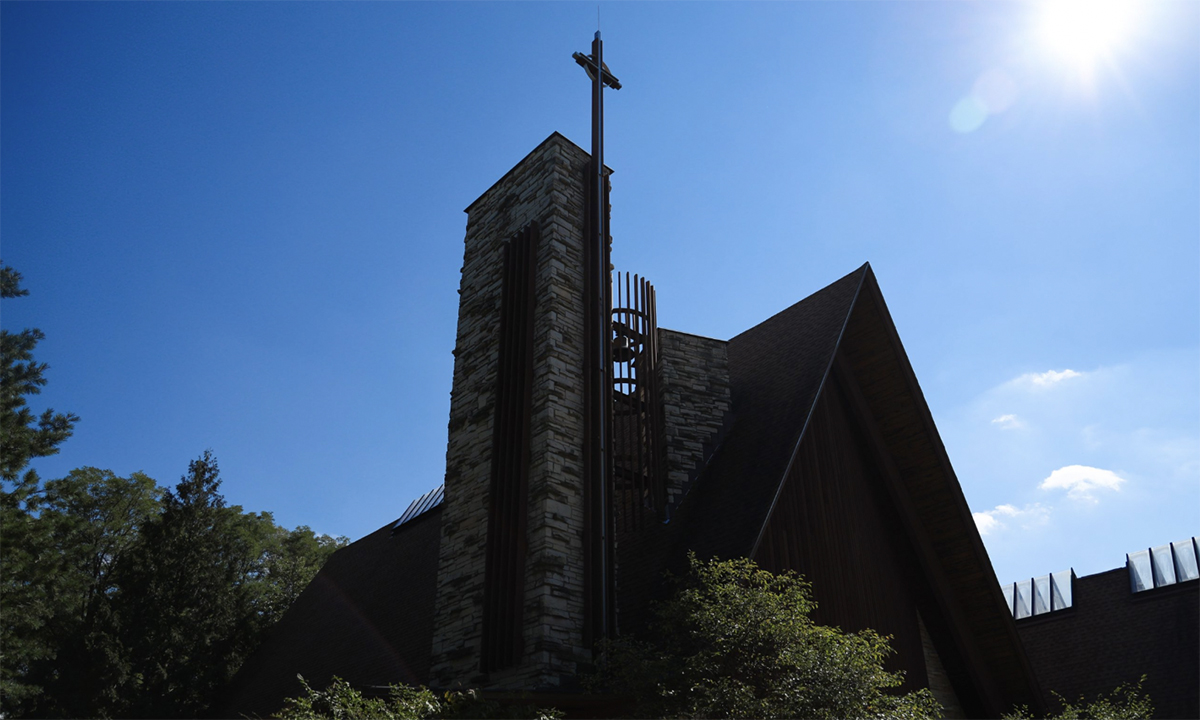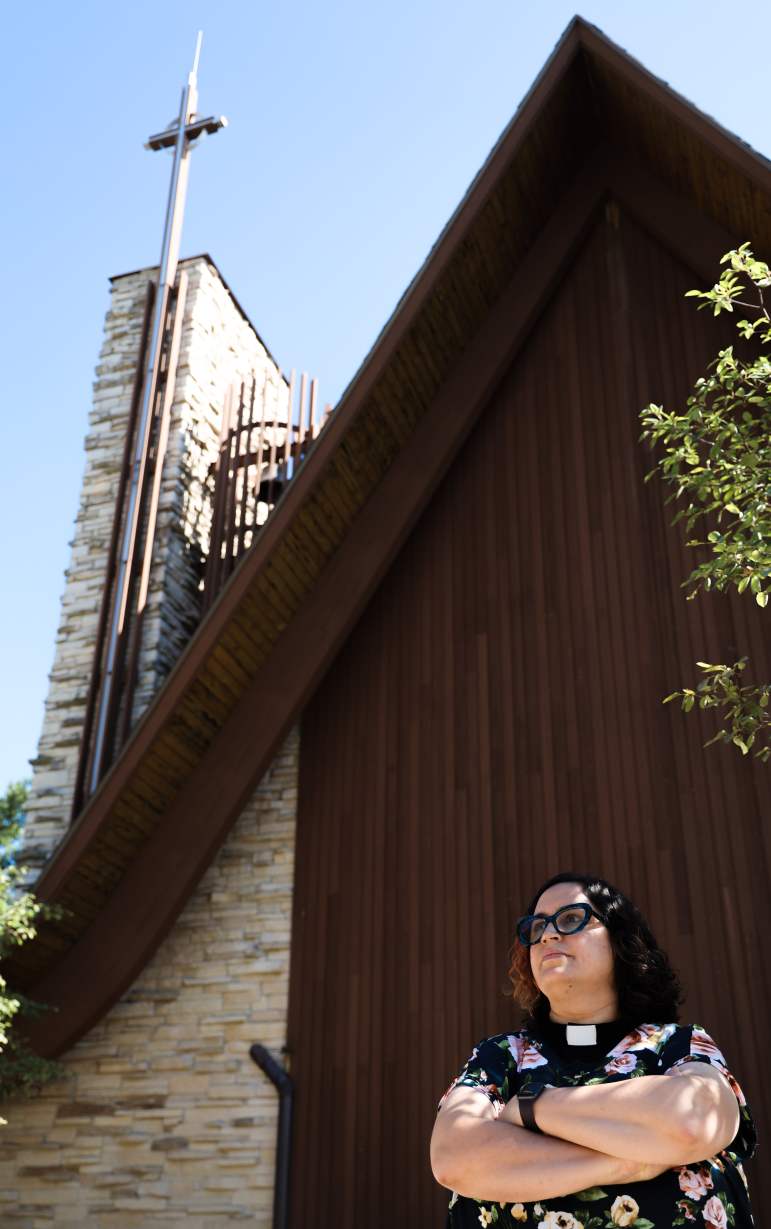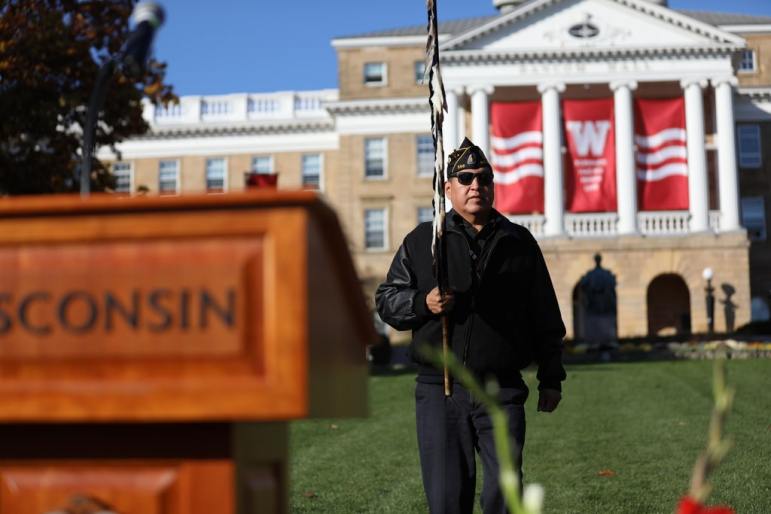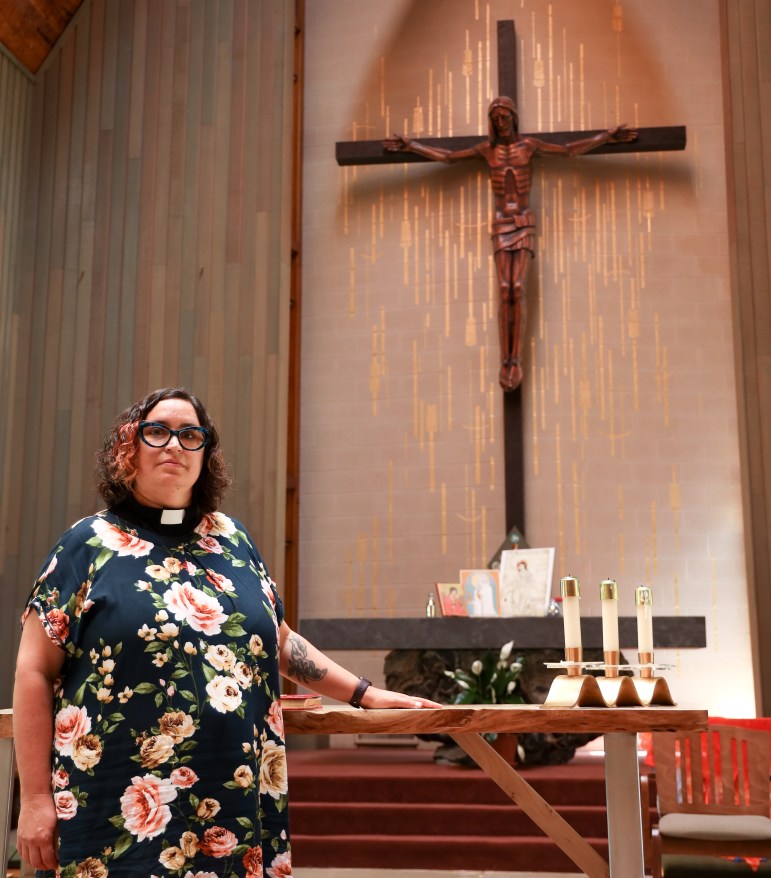‘It’s Something We Owe.’ Madison Church Pays ‘Voluntary Tax’ to Indigenous Nations
The $4,000 payment is part of an effort by St. Dunstan’s Episcopal Church to acknowledge its debt to Ho-Chunk who once lived there.

Get stories like these delivered straight to your inbox. Sign up for The 74 Newsletter
The history of Indigenous peoples in Wisconsin is deep and abundant, yet it’s a history that has long been glossed over without proper attention or, in many cases, unacknowledged completely.
St. Dunstan’s Episcopal Church on Madison’s west side is pushing against that narrative of erasure through a voluntary land tax that goes beyond simply acknowledging that the land under the church once belonged to the Ho-Chunk Nation — whose members were forced from the land.

“We started researching to understand how the land that the church stands on came to be the church’s land,” said the Rev. Miranda Hassett, rector of St. Dunstan’s. “We felt like that needed to be accompanied by some restorative actions. Taking some actions to kind of make amends, and move toward restoring wholeness and being better allies, even in small ways.”
She added, “We’re pretty close to a historic Ho-Chunk village, in a part of the southwestern corner of Lake Mendota. That was part of the territory that was ceded in the 1832 Treaty that dislocated and removed the Ho-Chunk, so our initial thought was to make a gift to the Ho-Chunk tribe.”
Hassett contacted the Rev. Kerri Parker, executive director of the Wisconsin Council of Churches (WCC). St. Dunstan’s is a member of the WCC, and Hassett thought the effort could benefit from collaboration. As an organization with 75 years of history that connects 21 different Christian traditions across the state, the WCC is no stranger to facilitating solutions to modern social issues.
“We find that we can do a lot of things more effectively together than we could do alone,” Parker said. “Our core values … that animate our work are courage, justice and holy imagination.”
Beyond working with social issues such as COVID safety, racial justice and refugee aid, the WCC is also committed to acknowledgement, restorative justice and current issues facing Indigenous communities.
“We have taken the time to start building relationships with leaders and educators,” Parker said. “You can say you want to give money, but you’re not really doing the work unless you have that meaning level between people … It’s about understanding why this money is changing hands, and how it all came to be.”
Parker connected Hassett to Bill Quackenbush, the Ho-Chunk’s tribal historic preservation officer. On Quackenbush’s advice, the church decided to pay the voluntary tax to the Wisconsin Inter-Tribal Repatriation Committee.

“That seemed like the appropriate entity,” Hassett said. “I think Bill was thinking, if this church does it, maybe other entities will follow suit. Rather than parse it out tribe by tribe and try to figure out exactly whose territory everybody’s sitting on, it makes sense for this organization that represents all the Wisconsin tribes to have that role here.”
Hassett said the church’s $4,000 payment is a first for the repatriation committee. Parker hopes it won’t be the last.
“I think about this event, this moment of possibility, as an example of instigating holy imagination in people,” she said. “Look at this thing that this church did. I wonder what we could do?”
‘We all have a creator’
Hassett presented the check to Quackenbush at the repatriation committee’s Aug. 16 meeting at the Radisson Hotel on the Oneida Reservation. The committee includes historic preservation officers from tribes in Wisconsin whose work includes repatriation of artifacts to Indigenous nations from individuals and state museums and preserving historic sites, such as effigy mounds.

“We all have a creator,” Quackenbush said. “All of this (land acknowledgements and donations) is symbolic of a healing process, but also a step forward. … The tribes can’t do it alone. We need state agencies and other organizations.”
The check was presented in a purple envelope, which Parker said is the color of repentance.
“We acknowledge that our ability to worship on Ho-Chunk land came at a great cost to those people,” Hassett said at the meeting.
Much discussion at the meeting revolved around the Doctrine of Discovery, which was Catholic doctrine that essentially permitted Christian European nations to subjugate and spread forced Christianity on Indigenous peoples in the Americas and Africa.
“The Doctrine has become the foundation of people’s understanding relative to North America and its original inhabitants,” she said. “The settlers had a sense of understanding that their mission was for God and king. That understanding has become part of our psyche. It’s ingrained in our laws and was part of the idea of Manifest Destiny. It’s not just history, but still happening today.”
‘This is something we owe’
Hassett said the payment is not charity — it’s part of the church’s budget of expenses related to owning the property.

“We have money we give away to organizations that are doing good in the community,” she said. “This is different from that. This isn’t from our charity, or generosity. This is something we owe. That was important to me.”
The voluntary land tax is just one piece of what Hassett sees as a multitude of ways in which work can be done to help mend a history that has seen Indigenous people subjugated and erased from social recognition.
“We want to be allies in the sense that, we’re going to observe Treaty Day in some way, we’re going to try to mark Missing and Murdered Indigenous Women’s Day, and when there’s an issue to protest or a legislative issue that’s important to the tribes, we’re going to pay attention, show up for that, and lend our voices.”
Teach The Truth Wisconsin is part of the Wisconsin Council of Churches’ effort to educate about U.S. history that includes how structural issues such racism, sexism and marginalization of Indigenous peoples have shaped the country and the effect they still have on society today.
“We’re encouraging people to make videos, have community events, or anything that helps people understand how vital it is that we tell these stories and rehearse these histories,” said Parker of the WCC. “In a time when there are movements that say, ‘That’s hurtful, or that makes people feel bad,’ it’s really important that we understand the truth and the difficult histories that are part of our legacy here in the United States.”

Hassett noted that St. Dunstan’s stands near an effigy mound, a reminder of the Ho-Chunk who once lived there — and their resilience.
“They were removed, but they kept coming back to their ancestral homelands to care for their ancestors’ graves and engage in the historical ecological practices of their people,” Hassett said. “Eventually, they were able to buy land and really reestablish a stake in Wisconsin, which is amazing.”
This article first appeared on WisconsinWatch.org and is republished here under a Creative Commons license.
Get stories like these delivered straight to your inbox. Sign up for The 74 Newsletter

;)